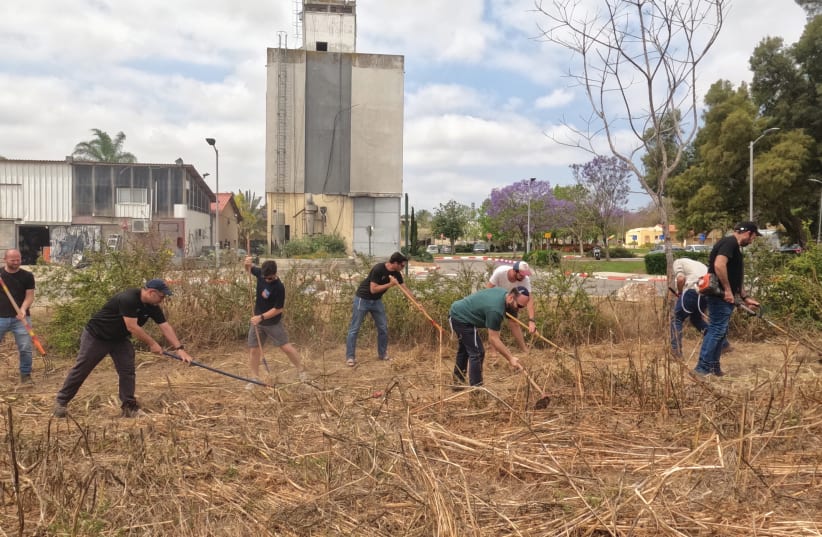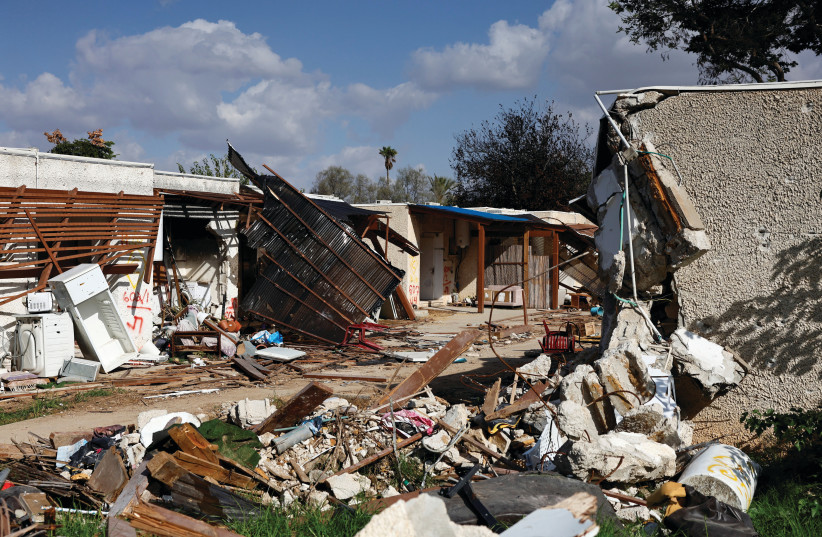The entrance to Kfar Aza is a half-kilometer stretch of road that leads from a gas station to the front gate of the kibbutz. It’s a quiet ribbon of pavement, bordered by swaying trees and open fields on both sides. Unassuming, yet beautiful. Tranquil. The people are kind and passionate. They care about their land, their families, and their neighbors. Kfar Aza, with its simple charm, embodies a profound love for Israel and a fervent longing for peace.
My friend Jacob made a right from the highway, passing the gas station, and we drove down the long road silently, overwhelmed by déjà vu and sadness. The last and only time we were there was seven months earlier, on October 7, 2023, and we hadn’t been wearing jeans and t-shirts.
Our reserve paratrooper unit received the call to report to base at around 10 a.m. on that Shabbat morning, and five hours later we found ourselves on Humvees, holding weapons that had just been handed to us, driving past unspeakable scenes of carnage on our way down to the southern border.
“Our brothers and sisters are being slaughtered as we speak,” our division commander told us when we unloaded. “There’s no intel, no plan of attack. Terrorists are waiting for you. Get in two lines, march into the kibbutz, and save our people.”
We were nervous but driven. So we did exactly that. We marched down that road in two lines. Shortly after we started walking, terrorists engaged us with gunfire. So began the three and a half days of our fight for Kfar Aza.
This time, Jacob and I drove down, gazing out at the locations where bodies of civilians and fellow soldiers had previously been strewn. It was surreal. On October 7, we couldn’t process anything; we were there to fight, and that’s all we focused on. But now, it was so much more real. We knew what had happened there. We saw it and stopped it when we could. Reality hit us with a wave of sorrow. We kept driving.
Rebuilding Kfar Aza
We pulled up to the front gate and got out to hug our friends and commanding officers, who were waiting for us with smiles on their faces. God, it was good to see them again.
We had all come back to volunteer in the rebuilding effort and walk through the kibbutz, hearing stories from the residents in the places where we fought. Our intended goal was to get some much-needed closure – closure for wounds that were still open and bleeding. But more than that, we wanted to give – to give even more than we had already given to help these people, this community, as much as possible.
We stood in a circle, listening to the head of the volunteer project, a Kfar Aza resident, tell her story and explain how we could help. She didn’t really know how to process the fact that we had fought there, but I saw the meaning in her eyes. She knew we had saved friends of hers but probably also assumed that we had witnessed the deaths of other friends as well. The emotion in the air was palpable, and we all listened intently to what she had to say.
Afterward, we followed her, tools in hand, to a nearby field that had been destroyed by fire. There we worked, in the heat, clearing the field of damaged roots and shrubbery. It was a relatively simple task, and for the first time in seven months, we felt like we could breathe.
It’s difficult to describe it exactly; for a moment, we didn’t have to think about what we or these people had been through, or when we would have to go back to war, or our jobs back at home. We were exactly where we needed and wanted to be, playing a small role in rebuilding this beautiful kibbutz. Our blistered hands didn’t bother us, nor did the sun. We were content.
After completing the job, we set out on the exact path we had taken in the opening days of the war. Almost nothing had been touched. The toy bicycle I had stepped over to get into a house was still there. Mugs were out on coffee tables. It was a place frozen in time.
We walked calmly down streets that we had previously sprinted across, hoping not to get hit by the enemy. We passed the factory that we had taken over and where we had found survivors. The manager came out and told us his own story. I choked back tears as I recognized the spot where I had first called my wife, telling her that I was okay, while my partner covered me.
Eventually, we got there. To the place that truly changed all of us forever. People know it from pictures or news videos; it’s famous for all the wrong reasons. In the “young neighborhood” of Kfar Aza, where some of the worst of the October 7 massacre took place, it felt like I was there just yesterday. I was trying not to look or see; then, after seeing, I was trying not to remember.
But our job was more important than our innocence at the time. We went into each apartment with weapons ready, bracing ourselves physically for gunfire and emotionally for the horror that lay within. We didn’t know it then, but we would never be the same.
SO THERE we stood once again. The road had been cleared, the bodies were removed, but it was still the same place. The destroyed buildings, the fire damage, and the shoes of the murdered and kidnapped remained untouched.
There were posters now lining the entire street, and the faces of all those we had failed to save stared out at us. We walked solemnly in silence. There was simply nothing to say. A tour group of English speakers walked by, led by a guide. I thought that to them, we appeared to be just another group. But we weren’t.
A few minutes went by, or an hour, and then we walked back to the kibbutz entrance together. We sat on the grass and talked. Being back, we had all felt some kind of positive release, but in a way, it only renewed the pain. There was still a war, there were still hostages, and soldiers were still being killed. It was far from over.
One of the commanders said something that resonated with me: when invited to speak to a large group about October 7, he realized that he didn’t have to write a single thing down, nor did he want to. He said that this experience is very much alive and breathing within him, and he believes that it always will be.
I got home a couple of hours later and hugged my wife and baby boy. I felt so lucky, so blessed. I had everything in the world; there was nothing more I could possibly want or need. I’m certain my brothers-in-arms all felt the same.
The writer is an IDF reserve paratrooper and former lone soldier. He has fought on multiple fronts in the current war, including Kfar Aza on October 7, southern Gaza, and Israel’s northern border.

